英汉句子翻译
英汉翻译 句子翻译二

句子翻译(二)——语态变换法
[<]
Those who perform deeds of merit will be rewarded.
立功的人将受到奖励。
Our roof was damaged in last night’s storm.
路易斯公司的一辆拖车把你的汽车拖走了。
句子翻译(二)——语态变换法
[<]
The compass was invented in China four thousand years ago.
中国在四千年前发明了指南针。
Energy is defined as the ability to do work.
如果有人向你提出私人的问题,你尽可不答。
句子翻译(二) ——语态变换法
[<]
3. 译为判断句
The credit system in America was first adopted by Harvard University in 1872.
美国的学分制是1782年在哈佛大学首先实施的。
The science fiction has been translated into Chinese by a friend of mine.
句子翻译(二)——语态变换法 练习答案
[<]
• 1.新学生规定要见习一个学期。 • 2.随着战争的爆发,飞行日益增加。 • 3.大部分问题已经圆满的解决了,只剩下几个次要问题需要
讨论。 • 4.这液体在室温下和盐混合了。 • 5.本来就很明显,这项计划得一笔勾销。 • 6.过了一会,达成了协议。 • 7.匆匆忙忙拟定了一个应急计划。 • 8.已经为那桩事拨了一大笔款项。 • 9.必须有一个袭击敌人所在地的计划。
高级英语第二册句子翻译
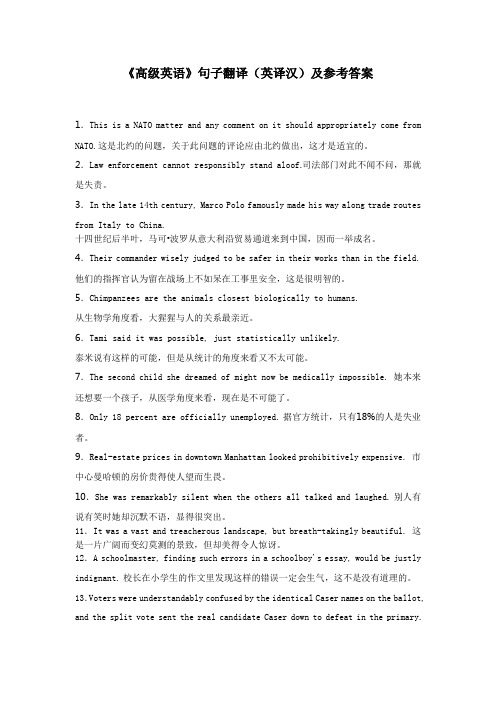
《高级英语》句子翻译(英译汉)及参考答案1.This is a NATO matter and any comment on it should appropriately come from NATO.这是北约的问题,关于此问题的评论应由北约做出,这才是适宜的。
2.Law enforcement cannot responsibly stand aloof.司法部门对此不闻不问,那就是失责。
3.In the late 14th century, Marco Polo famously made his way along trade routes from Italy to China.十四世纪后半叶,马可•波罗从意大利沿贸易通道来到中国,因而一举成名。
4.Their commander wisely judged to be safer in their works than in the field.他们的指挥官认为留在战场上不如呆在工事里安全,这是很明智的。
5.Chimpanzees are the animals closest biologically to humans.从生物学角度看,大猩猩与人的关系最亲近。
6.Tami said it was possible, just statistically unlikely.泰米说有这样的可能,但是从统计的角度来看又不太可能。
7.The second child she dreamed of might now be medically impossible.她本来还想要一个孩子,从医学角度来看,现在是不可能了。
8.Only 18 percent are officially unemployed. 据官方统计,只有18%的人是失业者。
9.Real-estate prices in downtown Manhattan looked prohibitively expensive.市中心曼哈顿的房价贵得使人望而生畏。
英汉句子翻译

英汉句子翻译1.His frequent interference in other people’s private affairs is very annoying.他常常干预别人的私事,真恼人。
2.Astonishment and even horror oppressed him.他感到惊讶甚至恐惧。
3.He has an unpleasant habit of expressing contradictory ideas in rapid succession.她有个不讨人喜欢的习惯:一会儿一个看法,自相矛盾。
4.Not only politeness but an attitude of reverence is demanded in church.在教堂里不仅要有礼貌,而且要有一种虔诚的态度。
5.Excitement deprived me of all power of utterance.我兴奋得什么话都说不出来。
6.The sight of the big tree always reminds me of my childhood.我一看到那棵大树就想起了童年的情景。
7.He was impressed by Deng Xiaoping’s flexibility.他对邓小平的灵活态度印象深刻。
8.She is the best hater I’ve ever known.我所认识的人中数她最会记仇。
9.It was only my capacity for hard work that saved me from early dismissal.要不是我能干重活,早就给辞退了。
10.It is advised that the man who was seen to take an umbrella from the lecturetheatre last Sunday put it back if he does not wish to get into trouble.上星期傍晚,有人看到某人在演讲厅取走雨伞一把,取伞者如不愿卷入纠纷,还是将伞放回原处为好。
句子翻译英译汉
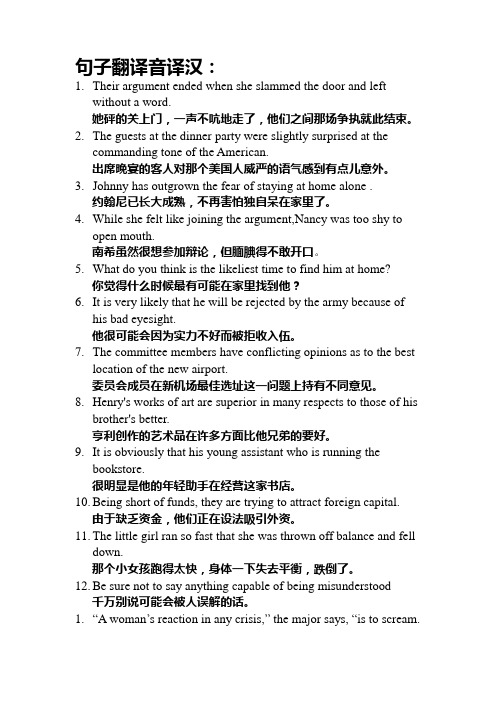
句子翻译音译汉:1.Their argument ended when she slammed the door and leftwithout a word.她砰的关上门,一声不吭地走了,他们之间那场争执就此结束。
2.The guests at the dinner party were slightly surprised at thecommanding tone of the American.出席晚宴的客人对那个美国人威严的语气感到有点儿意外。
3.Johnny has outgrown the fear of staying at home alone .约翰尼已长大成熟,不再害怕独自呆在家里了。
4.While she felt like joining the argument,Nancy was too shy toopen mouth.南希虽然很想参加辩论,但腼腆得不敢开口。
5.What do you think is the likeliest time to find him at home?你觉得什么时候最有可能在家里找到他?6.It is very likely that he will be rejected by the army because ofhis bad eyesight.他很可能会因为实力不好而被拒收入伍。
7.The committee members have conflicting opinions as to the bestlocation of the new airport.委员会成员在新机场最佳选址这一问题上持有不同意见。
8.Henry's works of art are superior in many respects to those of hisbrother's better.亨利创作的艺术品在许多方面比他兄弟的要好。
唯美英汉互译句子

唯美英汉互译句⼦1. 唯美的英⽂句⼦,最好带翻译1、英⽂:Please allow me to small proud, because like you depend on.中⽂:请容许我⼩⼩的骄傲,因为有你这样的依靠。
2、英⽂:I'm just a sunflower, waiting for belong to me only sunshine.中⽂:我只是⼀朵向⽇葵,等待属于我的唯⼀的阳光。
3、英⽂:We are all "were", blurred our closest happiness.中⽂:我们都是“远视眼”,模糊了离我们最近的幸福。
4、英⽂:We are all too young, a lot of things don't yet know, don't put the wrong loves when gardeners.中⽂:我们都太年轻,很多事都还不了解,别把错爱当恩宠。
5、英⽂:Gentle to have, but not compromise, I want to be in quiet, not strong.中⽂:温柔要有,但不是妥协,我要在安静中,不慌不忙的坚强。
6、英⽂:The life most of the time, commitments equals to constrain, reluctantly we yearn for bound.中⽂:⼈⽣的⼤部份时间⾥,承诺同义词是束缚,奈何我们向往束缚。
7、英⽂:Important people, less and less people left more and more important.中⽂:重要的⼈越来越少,留下来的⼈越来越重要。
8、英⽂:Only opposed every day, will live the strong than you imagine.中⽂:每天只有逞强着,才会活得⽐你们想象中的坚强。
英语书后句子翻译英汉转换

英语书后句子翻译英汉转换一、1. 这座房子在地震中损毁严重,汤姆花了不少钱来修它。
The house was badly damaged in the earthquake, and Tom spent a lot of moneyrenovating it.2. 正如史蒂夫·乔布斯所指出的,不断摸索一直都是苹果模式的一部分。
As Steve Jobs noted, trial and error has always been part of the Apple model.3. 如果你总是无所事事,最后结果会怎样呢?当然是失败If you are idling around all the time, what will you wind up with? Of course, failure.4. 别犯错———现在可是关键时刻,谨慎是永远不会错的Don’t make a blunder—it is a critical time now, and caution will never be wrong.5. 你不要为难自己,毕竟你是个新手。
You shouldn’t beat yourself up; after all, you are a green hand.二、1.政府正努力改善公众的住房条件?The government is striving for improvements in public housing.2. 这五个圆环被认为象征了五大洲:欧洲?亚洲?非洲?大洋洲以及美洲?The five rings are thought to symbolize the five continents: Europe, Asia, Africa, Oceania and America.3.他父亲淡淡地一笑,试图要他放心,一切都安然无恙。
His father smiled weakly in an attempt to reassure him that everything was all right.4. 他的沉默实际就是拒绝。
英汉对照全译大全
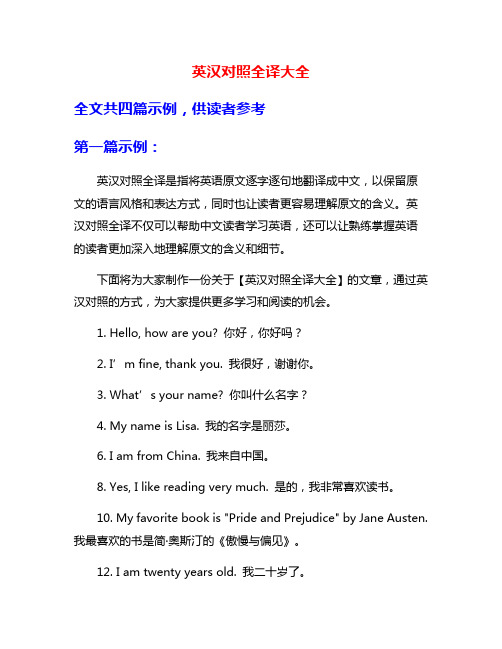
英汉对照全译大全全文共四篇示例,供读者参考第一篇示例:英汉对照全译是指将英语原文逐字逐句地翻译成中文,以保留原文的语言风格和表达方式,同时也让读者更容易理解原文的含义。
英汉对照全译不仅可以帮助中文读者学习英语,还可以让熟练掌握英语的读者更加深入地理解原文的含义和细节。
下面将为大家制作一份关于【英汉对照全译大全】的文章,通过英汉对照的方式,为大家提供更多学习和阅读的机会。
1. Hello, how are you? 你好,你好吗?2. I’m fine, thank you. 我很好,谢谢你。
3. What’s your name? 你叫什么名字?4. My name is Lisa. 我的名字是丽莎。
6. I am from China. 我来自中国。
8. Yes, I like reading very much. 是的,我非常喜欢读书。
10. My favorite book is "Pride and Prejudice" by Jane Austen. 我最喜欢的书是简·奥斯汀的《傲慢与偏见》。
12. I am twenty years old. 我二十岁了。
13. What do you do for a living? 你是做什么工作的?14. I am a teacher. 我是一名教师。
16. I enjoy listening to music and watching movies. 我喜欢听音乐和看电影。
17. Have you ever traveled abroad? 你有没有去过国外旅行?21. Do you have any siblings? 你有兄弟姐妹吗?22. Yes, I have one brother and one sister. 是的,我有一个哥哥和一个妹妹。
23. Are you married? 你结婚了吗?26. I plan to further my education and travel around the world. 我计划继续教育并环游世界。
[经典英译汉翻译句子]英译汉在线翻译句子
![[经典英译汉翻译句子]英译汉在线翻译句子](https://img.taocdn.com/s3/m/49a81282d5d8d15abe23482fb4daa58da0111cfc.png)
[经典英译汉翻译句子]英译汉在线翻译句子(1) [英译汉在线翻译句子]优美的英译汉句子优美的英译汉句子(精选篇)No man or woman is worth your tears, and the one who is, won‘t make you cry没有人值得你流泪,值得让你这么做的人不会让你哭泣。
The worst way to miss someone is to be sitting right beside them knowing you can‘t have them失去某人,最糟糕的莫过于,他近在身旁,却犹如远在天边。
Love is like a butterfly It goes where it pleases And it pleases where it goes爱情就像一只蝴蝶,它喜欢飞到哪里,就把欢乐带到哪里。
Where there is great love, there are always miracles 哪里有真爱存在,哪里就有奇迹。
The only thing you can do when you no longer have something is not to forget当你不能再拥有的时候,唯一可以做的就是令自己不要忘记。
thousand of time i have thought of you my heart is going highinto the air and flying with my blessing towards you i don"t care loneliness i am satisfied when you are happy and i am happy when i think of you!千万个思念,在空气中凝固。
扬起风吹向你,带着的祝福,寂寞不在乎,你快乐就满足,想你是的幸福!I need him like I need the air to breathe我需要他,正如我需要呼吸空气。
英汉翻译 句子翻译三
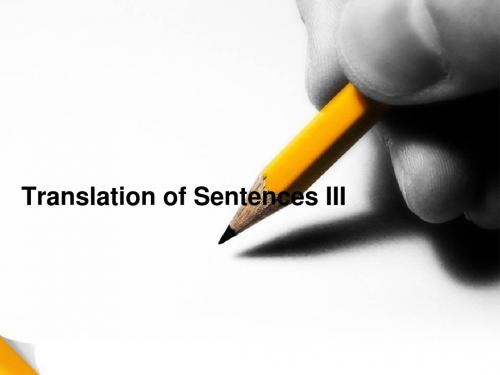
句子翻译(三)常见句型的翻译——定语从句的翻译
[<]
I、译成前置定语
一般说来,限制性的定语从句可提前译成定语。还有一些 定语从句,虽然并不明显地带有限制性质,但本身较短,和被 修饰语的关系紧密,也可译成前置定语。 1. To be sure, a great rebuilding project would give jobs to many of those people who need them.
Translation of Sentences III
句子翻译(三)---常见句型翻译
[<]
常见句型的翻译:
定语从句的翻译
状语从句的翻译 名词性从句的翻译
长句的翻译
句子翻译(三) 常见句型的翻译——定语从句的翻译
定语从句的译法
[<]
Attributive clauses are widely used in English. In many cases, sentences are made very long because of attributive clauses. Hence it is important to have a correct comprehension and an accurate translation of attribute clauses. Different attributive clauses may express different meaning such as purpose, concession, result and so on. An attributive clause usually follows the word it modifies. This is different from Chinese. In Chinese there is no post-position attributive and there can’t be too many modifiers preceding the modified word. All this causes changes in translating some sentences which contain attributive clauses.
九年级英汉句子翻译
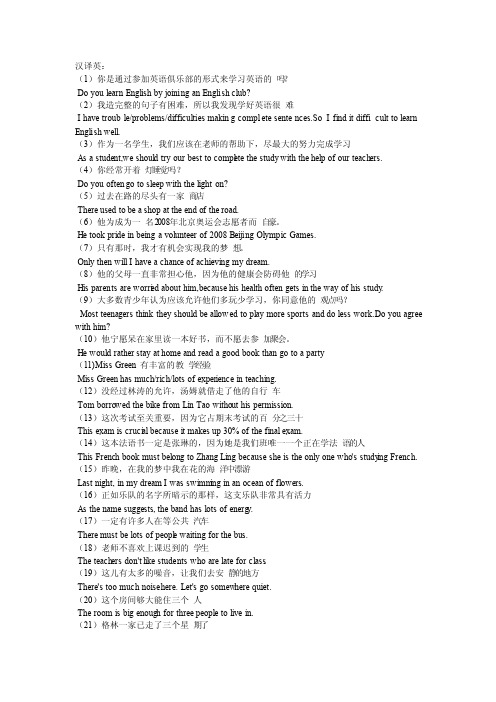
汉译英:(1)你是通过参加英语俱乐部的形式来学习英语的吗?Do you learnEnglis h by joinin g an Englis h club?(2)我造完整的句子有困难,所以我发现学好英语很难I have troubl e/proble ms/diffic ultie s making comple te senten ces.So I find it diffic ult to learnEnglis h well.(3)作为一名学生,我们应该在老师的帮助下,尽最大的努力完成学习As a studen t,we should try our best to comple te the studywith the help of our teache rs.(4)你经常开着灯睡觉吗?Do you oftengo to sleepwith the lighton?(5)过去在路的尽头有一家商店Thereused to be a shop at the end of the road.(6)他为成为一名2008年北京奥运会志愿者而自豪。
He took pridein beinga volunt eer of 2008 Beijin g Olympi c Games.(7)只有那时,我才有机会实现我的梦想。
Only then will I have a chance of achiev ing my dream.(8)他的父母一直非常担心他,因为他的健康会防碍他的学习His parent s are worrie d abouthim,becaus e his health oftengets in the way of his study.(9)大多数青少年认为应该允许他们多玩少学习,你同意他的观点吗?Most teenag ers thinkthey should be allowe d to play more sports and do less work.Do you agreewith him?(10)他宁愿呆在家里读一本好书,而不愿去参加聚会。
期末考试句子翻译复习-英译汉
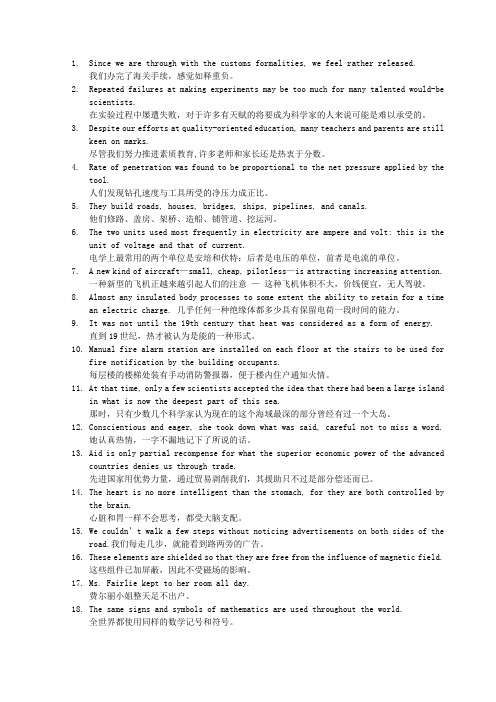
1.Since we are through with the customs formalities, we feel rather released.我们办完了海关手续,感觉如释重负。
2.Repeated failures at making experiments may be too much for many talented would-bescientists.在实验过程中屡遭失败,对于许多有天赋的将要成为科学家的人来说可能是难以承受的。
3.Despite our efforts at quality-oriented education, many teachers and parents are stillkeen on marks.尽管我们努力推进素质教育,许多老师和家长还是热衷于分数。
4.Rate of penetration was found to be proportional to the net pressure applied by thetool.人们发现钻孔速度与工具所受的净压力成正比。
5.They build roads, houses, bridges, ships, pipelines, and canals.他们修路、盖房、架桥、造船、铺管道、挖运河。
6.The two units used most frequently in electricity are ampere and volt: this is theunit of voltage and that of current.电学上最常用的两个单位是安培和伏特:后者是电压的单位,前者是电流的单位。
7. A new kind of aircraft—small, cheap, pilotless—is attracting increasing attention.一种新型的飞机正越来越引起人们的注意—这种飞机体积不大,价钱便宜,无人驾驶。
英语英汉互译练习
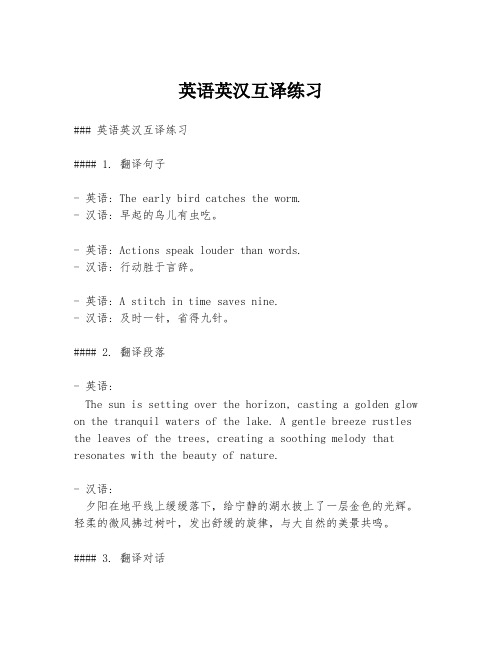
英语英汉互译练习### 英语英汉互译练习#### 1. 翻译句子- 英语: The early bird catches the worm.- 汉语: 早起的鸟儿有虫吃。
- 英语: Actions speak louder than words.- 汉语: 行动胜于言辞。
- 英语: A stitch in time saves nine.- 汉语: 及时一针,省得九针。
#### 2. 翻译段落- 英语:The sun is setting over the horizon, casting a golden glow on the tranquil waters of the lake. A gentle breeze rustles the leaves of the trees, creating a soothing melody that resonates with the beauty of nature.- 汉语:夕阳在地平线上缓缓落下,给宁静的湖水披上了一层金色的光辉。
轻柔的微风拂过树叶,发出舒缓的旋律,与大自然的美景共鸣。
#### 3. 翻译对话- 英语:- A: What's the weather like today?- B: It's a beautiful day with clear skies and a gentle breeze.- 汉语:- A: 今天天气怎么样?- B: 今天天气很好,天空晴朗,微风习习。
#### 4. 翻译文章- 英语:The art of translation is a delicate balance between preserving the original meaning and adapting it to the nuances of the target language. It requires not only a deep understanding of both languages but also a keen sense of cultural context.- 汉语:翻译艺术是在保持原文意义和适应目标语言微妙之处之间的微妙平衡。
英汉句子翻译

• 7.2.2英语特殊结构汉译时主语的选择 • 7.2.2.1英语的被动句 • 英语的被动句表述客观的实事和态度, 多用于科技文章、新闻报道、书刊介绍、 景物描写等,汉语被动句表示发生的不 愉快的事实。 • 一,保留主语,谓语动词可用“被”结 构,也可转换为主动语态。 • 例13:They were defeated by themselves, rather than by their enemies.
• 5, They may teach very well and more than earn their salaries, but most of them make little or no independent reflections on human problems,which involve moral judgment. • 2006年全国英语考研翻译试题
• 例14:Many basins were formed by the subsidence of the earth’s crust. • 例15:A prototype of another display, called the Military E-book, should be completed next January or February. • 二,用“我们、人们、大家”等表泛指的 代词充当译语主语。 • 例16:The existence of oil wells has been known for a long time. • 例17:After many years, regular mail carriers on horseback were hired.
第七章英汉句子翻译 7.1 英汉句子结构对比
• • • • • • • • 英语 主语突出 常用无灵主语 叙述多呈静态 组句多焦点透视 句式呈树式结构 思维重逻辑 句式严谨规范 • • • • • • • • 汉语 主题突出 有灵主语 叙述多呈动态 组句多散点透视 句式呈竹状结构 思维重语感 句式灵活多变
英汉句子翻译

英汉句子翻译1.Some people, arguing with you every day, but don't blame you; Some people,even the quarrel all have no, but already disappeared into the crowd.有的人,每天与你争吵,却不曾怪罪于你。
有的人,甚至连争吵都没有,却已经消失在茫茫人海。
2.Speak out your love for you never know tomorrow and accident, which will comefirst.大胆说出你的爱(吧),因为对你来说永远不知道明天和意外哪个会先来。
3.Don't say that opportunities never come.不要说机会从来没有出现过。
4.It came but you just don't willing to give up the things you own.它曾经出现过,只是你舍不得放下自己拥有的东西。
5.True friend is someone who will support you even if it hurts their own interest.They give without expecting anything in return.真正的朋友是全力以赴支持你的人,不惜牺牲自己的利益而不求回报!6.There are things that we don't want to happen but have to accept, things we don'twant to know but have to learn, and people we can't live without but have to let go.总有一些事,我们不愿它发生,却必须接受;总有些东西,我们不想知道, 却必须了解;总有些人, 我们不能没有, 却必须学着放手。
翻译句子英译汉范文
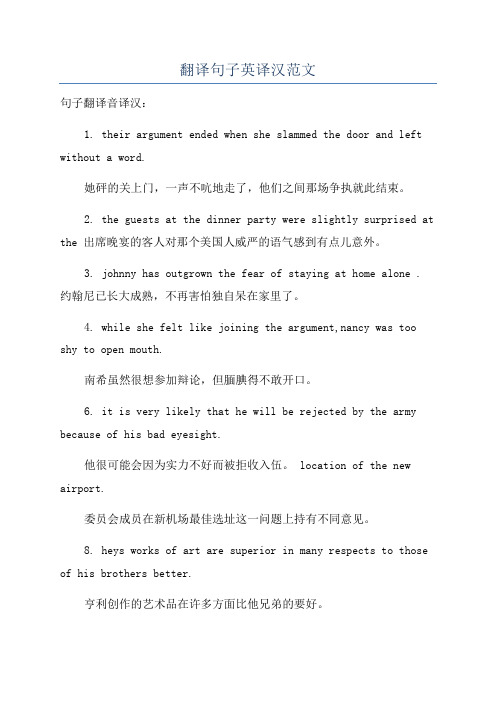
翻译句子英译汉范文句子翻译音译汉:1. their argument ended when she slammed the door and left without a word.她砰的关上门,一声不吭地走了,他们之间那场争执就此结束。
2. the guests at the dinner party were slightly surprised at the 出席晚宴的客人对那个美国人威严的语气感到有点儿意外。
3. johnny has outgrown the fear of staying at home alone . 约翰尼已长大成熟,不再害怕独自呆在家里了。
4. while she felt like joining the argument,nancy was too shy to open mouth.南希虽然很想参加辩论,但腼腆得不敢开口。
6. it is very likely that he will be rejected by the army because of his bad eyesight.他很可能会因为实力不好而被拒收入伍。
location of the new airport.委员会成员在新机场最佳选址这一问题上持有不同意见。
8. heys works of art are superior in many respects to those of his brothers better.亨利创作的艺术品在许多方面比他兄弟的要好。
9. it is obviously that his young assistant who is running the bookstore.很明显是他的年轻助手在经营这家书店。
10. being short of funds, they are trying to attract foreign capital. 由于缺乏资金,他们正在设法吸引外资。
英汉翻译的经典句子分析
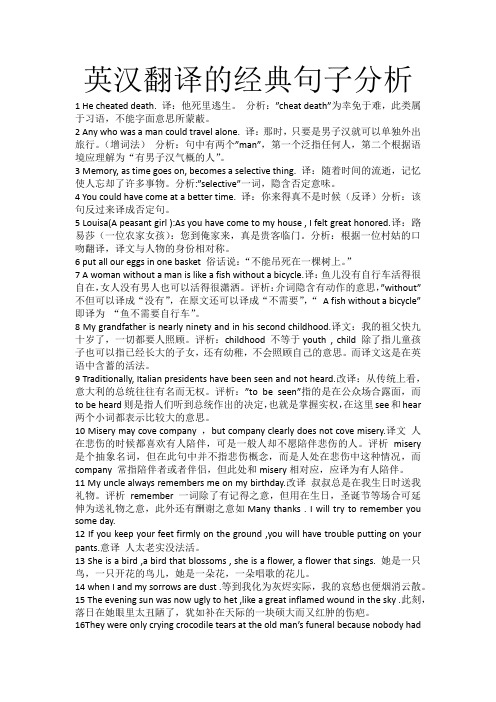
英汉翻译的经典句子分析1 He cheated death. 译:他死里逃生。
分析:”cheat death”为幸免于难,此类属于习语,不能字面意思所蒙蔽。
2 Any who was a man could travel alone. 译:那时,只要是男子汉就可以单独外出旅行。
(增词法)分析:句中有两个”man”,第一个泛指任何人,第二个根据语境应理解为“有男子汉气概的人”。
3 Memory, as time goes on, becomes a selective thing. 译:随着时间的流逝,记忆使人忘却了许多事物。
分析:”selective”一词,隐含否定意味。
4 You could have come at a better time. 译:你来得真不是时候(反译)分析:该句反过来译成否定句。
5 Louisa(A peasant girl ):As you have come to my house , I felt great honored.译:路易莎(一位农家女孩):您到俺家来,真是贵客临门。
分析:根据一位村姑的口吻翻译,译文与人物的身份相对称。
6 put all our eggs in one basket 俗话说:“不能吊死在一棵树上。
”7 A woman without a man is like a fish without a bicycle.译:鱼儿没有自行车活得很自在,女人没有男人也可以活得很潇洒。
评析:介词隐含有动作的意思,”without”不但可以译成“没有”,在原文还可以译成“不需要”,“A fish without a bicycle”即译为“鱼不需要自行车”。
8 My grandfather is nearly ninety and in his second childhood.译文:我的祖父快九十岁了,一切都要人照顾。
评析:childhood 不等于youth , child 除了指儿童孩子也可以指已经长大的子女,还有幼稚,不会照顾自己的意思。
英汉翻译练习之句子翻译

2.1When you walk through a town like this-two hundred thousand inhabitants of whom at least twenty thousand own literally nothing except the rags they stand up in-when you see how the people live, and still more how easily they die, it is always difficult to believe that you are walking among human beings. All colonial empires are in reality founded upon this fact. The people have brown faces besides, there are so many of them! Are they really the same flesh as your self? Do they even have names? Or are they merely a kind of undifferentiated brown stuff, about as individual as bees or coral insects? They rise out of the earth, they sweat and starve for a few years, and then they sink back into then they are gone. And even the graves themselves soon fade back into the soil. Sometimes, out for a walk as you break your way through the prickly pear, you notice that it is rather bumpy underfoot, and only a certain regularity in the bumps tells you that you are walking over skeletons.2.2All people who work with their hands are partly invisible, and the more important the work they do, the less visible they are, Still, a white skin is always fairly conspicuous. In northern Europe, when you see a labourer ploughing a field, you probably give him a second glance. In a hot country, anywhere south of Gibraltar or east of Suez, the chances are that you don‟t even see him, I have noticed this again and again. In a tropical landscape one‟s eye takes in everything except the human beings, It takes in the dried-up soil, the prickly pear, the palm tree and the distant mountain, but it always misses the peasant hoeing at his patch. He is the same colour as the earth, and a great deal less interesting to look at.2.3But what is strange about these people is their invisibility. For several weeks, always at about the same time of day, the file kg old women had hobbled past the house with their firewood, and though they had registered themselves on my eyeballs I cannot truly say that I had seen them. Firewood was passing - that was how I saw it. It was only that one day I happened to be walking behind them, and the curious up-and-down motion of a load of wood drew my attention to the human being beneath it. Then for the first time I noticed the poor old earth –coloured bodies, bodies reduced to bones and leathery skin, bent double under the crushing weight. Yet I suppose I had not been five minutes on Moroccan soil before I noticed the overloading of the donkeys and was infuriated by it. There is no question that the donkeys are damnably treated. The Moroccan donkey is hardly bigger than a St. Bernard dog, it carries a load which in the British Army would be considered too much for a fifteen-hands mule, and very often its packsaddle is mot taken off its back for weeks together. But what is peculiarl y pitiful is that it is the most willing creature on earth, it follows its master like a dog and does mot need either bridle or halter. After a dozen years of devoted work it suddenly drops dead, whereupon its master tips it into the ditch and the village dogs have torn its guts out before it is cold.2.4It was curious really. Every white man there had this thought stowed somewhere or other in his mind. I had it, so had the other onlookers, so had the officers on theirsweating chargers and the white N. C. Os marching in the ranks. It was a kind of secret which we all knew and were too clever to tell; only the Negroes didn‟t know it. And really it was like watching a flock of cattle to see the long column, a mile or two miles of armed men, flowing peacefully up the road, while the great white birds drifted over them in the opposite direction, glittering like scraps of paper.3.4The charm of conversation is that it does mot really start from anywhere, and no one has any idea where it will go as it meanders or leaps and sparkles or just glows. The enemy of good conversation is the person who has “something to say.”Conversation is not for making a point. Argument may often be a part of it, but the purpose of the argument is mot to convince. There is no winning in conversation. In fact, the best conversationalists are those who are prepared to lose. Suddenly they see the moment for one of their best anecdotes, but in a flash the conversation has moved on and opportunity is lost. They are ready to let it go.3.5So we may return to my beginning. Even with the most educated and the most literate, the King‟s English slips and slides in conversation. There is mo worse conversationalist than the one who punctuates his words as he speaks as if he were writing, or even who tries to use words as if he were composing a piece of prose for print. When E. M. Forster writes of “the sinister corridor of our age,” we sit up at the vividness of the phrase, the force and even terror in the image. But if E. M. Forster sat in our living room and said, “We are all following each other down the sinister corridor of our age,” we would be justified in asking him to leave.4.6We observe today not a victory of party but a celebration of freedom, symbolizing an end as well as a beginning, signifying renewal as well as change. For I have sworn before you and Almighty God the same solemn oath our forebears prescribed nearly a century and three-quarters ago.The world is very different now. For man holds in his mortal hands the power to abolish all forms of human poverty and all forms of human life. A nd yet the same revolutionary belief for which our forebears fought is still at issue around the globe, the belief that the rights of man come not from the generosity of the state but from the hand of god.4.7To our sister republics south of our border, we offer a special pledge: to convert our good words into good deeds, in a new alliance for progress, to assist free men and free governments in casting off the chains of poverty. But this peaceful revolution of hope cannot become the prey of hostile powers. Let all our neighbors know that we shall join with them to oppose aggression or subversion anywhere in the Americas. And let every other power know that this hemisphere intends to remain the master of its own house.4.8So let us begin anew, remembering on both sides that civility is mot a sign of weakness, and sincerity is always subject to proof. Let us never negotiate out of fear,but let us never fear to negotiate.Let both sides explore what problems unite us instead of belaboring those problems which divide us.Let both sides, for the first time, formulate serious and precise proposals for the inspection and control of arms, and bring the absolute control lf all nations.Let both sides seek to invoke the wonders of science instead of its terrors. Together let us explore the stars, conquer the deserts, eradicate disease, tap the ocean depths and encourage the arts and commerce.Let both sides unite to heed in all corners of the earth the command of Isaiah to “undo the heavy burdens… (and) let the oppressed go free”.4.9In the long history of the world, only a few generations have been granted the role of defending freedom in its hour of maximum danger. I do not shrink from this responsibility; I welcome it. I do mot believe that any of us would exchange places with any other people or any other generation. The energy, the faith, the devotion which we bring to this endeavor will light our country and all who serve it, and the glow from that fire can truly light the world.And so ,my fellow Anericans ask not what your country can do for you; ask what you can do for your country.My fellow citizens of the world, ask not what America will do for you , but what together we can do for the freedom of man.5.10Gracious she was. By gracious mean full of graces. She had an erectness of carriage, an ease of bearing, a poise that clearly indicated the best of breeding. At table her manners were exquisite. I had seen her at the Kozy Kampus Korner eating the specialty of the house –a sandwich that contained scraps of pot roast, gravy, chopped nuts, and a dipper of sauerkraut-without even getting her fingers moist.Intelligent she was not .In fact, she veered in the opposite direction. But I believed that under my guidance she would smarten up. At any rate, it was worth a try. It is, after all, easier to make a beautiful dumb girl smart than to make an ugly smart girl beautiful.5.11Heartened by the knowledge that Polly was not altogether a cretin, I began a long, patient review of all I had told her. Over and over and over again I cited instances, pointed out flaws, kept hammering away without let-up. It was like digging a tunnel. At first everything was work, sweat, and darkness. I had no idea when I would reach the light, or even if I would. But I persisted. I pounded and clawed and scraped, and finally I was rewarded. I saw a chink of light. And then the chink got bigger and the sun came pouring in and all was bright.6.12Science is committed to the universal. A sign of this is that the more successful a science becomes, the broader the agreement about its basic concepts: there is not a separate Chinese or American or soviet thermodynamics, for example; there is simply thermodynamics. For several decades of the twentieth century there was a Westernand a soviet genetics, the latter associated with Lysenko‟s theory that environmental stress can produce genetic mutations. Today Lysenko‟s theory is discredited, and there is now only one genetics.6.13If man creates machines, machines in turn shape their creators. As the automobile is universalized, it universalizes those who use it. Like the World Car he drives, modern man is becoming universal. No longer quite an individual, no longer quite the product of a unique geography and culture, he moves from one climate-controlled shopping mall to another, from one airport to the next, from one Holiday lnn to its successor three hundred miles down the road; but somehow his location never changes. He is cosmopolitan. The price he pays is that he no longer has a home in the traditional sense of the word. The benefit is that he begins to suspect home in the traditional sense is another name for limitations, and that home in the modern sense is everywhere and always surrounded by neighbors.6.14art is, in one definition, simply an effort to name the real world. Are machines “the real world” or only its surface? Is the real world that easy to find? Science has shown the insubstantiality of the world. It has thus undermined an article of faith: the thingliness of things. At the same time, it has produced images of orders of reality underlying the thingliness of things. Are images of cells or of molecules or of galaxies more or less real than images of machines? Science has also produced images that are pure artifacts. Are images of self-squared dragons more or less real than images of molecules?6.15The playfulness of the modern aesthetic is, finally, its most striking-and also its most serious and, by corollary, its most disturbing-feature. The playfulness of science that produces game theory and virtual particles and black holes and that, by introducing human growth genes into cows, forces students of ethics to reexamine the definition of cannibalism. The importance of play in the modern aesthetic should not come as a surprise. It is announced in every city in the developed world by the fantastic and playful buildings of postmodernism and neomodernism and by the fantastic juxtapositions of architectural styles that typify collage city and urban adhocism.7.16I am not speaking of mere filth. One expects steel towns to be dirty. What I allude to is the unbroken and agonizing ugliness, the sheer revolting monstrousness, of every house in sight. From East Liberty to Greensburg, a distance of twenty-five miles, there was not one in sight from the train that did not insult and lacerate the eye. Some were so bad, and they were among the most pretentious-churches, stores, warehouses, and the like - that they were downright startling; one blinded before them as one blinks before a man with his face shot away. A few linger in memory, horrible even there: a crazy little church just west of Jeannette, set like a dormer-window on the side of a bare leprous hill; the headquarters of the Veterans of Foreign wars at another forlorn town, a steel stadium like a huge rattrap somewhere further down theline. But most of all I recall the general effect –of hideousness without a break.7.17Here is something that the psychologists have so far neglected: the love of ugliness for its own sake, the lust to make the world intolerable. Its habitat is the United States. Out of the melting pot emerges a race which hates beauty as it hates truth. The etiology of this madness deserves a great deal more study than it has got. There must be causes behind it; it arises and flourishes in obedience to biological laws, and not as a mere act of God. What, precisely, are the terms of those laws? And why do they run stronger in America than elsewhere? Let some honest Privat Dozent in pathological sociology apply himself to the problem.9.18Joyous! How is one to tell about joy? How describe the citizens of Omelas?They were not simple folk, you see, though they were happy. But we do not say the words of cheer much any more. All smiles have become archaic. Given a description such as this one tends to make certain assumptions. Given a description such as this one tends to look next for the King, mounted on a splendid stallion and surrounded by his noble knights, or perhaps in a Golan litter borne by great-muscled slaves. But there was no king. They did not use swords, or keep slaves. They were not barbarians. I do not know the rules and laws of their society, but I suspect that they were singularly few. As they did without monarchy and slavery, so they also got on without the stock exchange, the advertisement, the secret police, and the bomb. Yet I repeat that these were not simple folk, not dulcet shepherds, noble savages, bland utopians. They were not less complex than us.9.19This is usually explained to children when they are between eight and twelve, whenever they seem capable of understanding; and most of those who come to see the child are young people, though often enough an adult comes, or comes back, to see the child. No matter how well the matter has been explained to them, these young spectators are always shocked and sickened at the sight. They feel disgust, which they had thought themselves superior to. They feel anger, outrage, impotence, despite all the explanations. They would like to do something for the child. But there is nothing they can do. If the child were brought up into the sunlight out of the vile place, if it were cleaned and fed and comforted, that would be a good thing, indeed; but if it were done, in that day and hour all the prosperity and beauty and delight of Omelas would wither and bedestroyed. Those are the terms. To exchange all the goodness and grace of every life in Omelas for that single, small improvement: to throw away the happiness of thousands for the chance of the happiness of one: that would be to let guilt within the walls indeed.10.20Actually, the revolt of the young people was a logical outcome of conditions in the age. First of all, it must be remembered that the rebellion was not confined to the United States, but affected the entire Western world as a result of the aftermath of the first serious war in a century. Second, in the United States it was reluctantly realized by some-subconsciously if not openly-that our country was no longer isolated ineither politics or tradition and that we had reached an international stature that would forever prevent us from retreating behind the artificial walls of a provincial morality or the geographical protection of our two bordering oceans.10.21The rejection of Victorian gentility was, in any case, inevitable. The booming of American industry, With its gigantic, roaring factories, its corporate impersonality, and its largescale aggressiveness, no longer left any room for the code of polite behavior and well-bred morality fashioned in a quieter and less competitive and. War or no war, as the generations passed, it became increasingly difficult for our young people to accept standards of behavior that bore no relationship to the bustling business medium in which they were expected to battle for success. The war acted merely as a catalytic agent in this breakdown of the Victorian social structure, and by precipitating our young people into a pattern of mass murder it released their inhibited violent energies which, after the shooting was over, were turned in both Europe and America to the destruction of an obsolescent nineteenth-century society.11.22To write about the English in standard and cosmopolitan political terms, the usual Left-Centre-Right stuff, is almost always wasting time and trouble. The English are different. The English are even more different than they think they are, though not more different than they feel they are. And what they feel-Englishness again-ismore important than what they think. Lt is instinctive feeling and not rational thought that shapes and colours actual events in England.For example, although the English seem to be so sharply divided, always indulging in plenty of loud political abuse, there are nothing like so many Communists or neo-or potential Fascists in England as there are in most other countries.11.23The real English, who are …different‟, who have inherited Englishness and have not yet thrown away their inheritance, cannot feel at home in the contemporary world, representing the accelerated development of our whole age. Lt demands bigness; and they are suspicious of bigness. (And there is now not only Industrial bigness; there is also Scientific bigness, needing more and more to discover less and less.) Clearly everything cannot be done by smallish and reasonably human enterprises. No cosy shipyard can undertake to build a 150,000-ton ship, But it is safe to say that while Englishness may reluctantly accept bigness, its monsters are never heartily welcomed. They look all right in America, itself so large, but seem altogether out of scale in England.1、当你穿行于这样的城镇其居民20万中至少有2万是除开一身聊以蔽体的破衣烂衫之外完全一无所有-当你看到那些人是如何生活,又如何动辄死亡时,你永远难相信自己是行走在人类之中。
- 1、下载文档前请自行甄别文档内容的完整性,平台不提供额外的编辑、内容补充、找答案等附加服务。
- 2、"仅部分预览"的文档,不可在线预览部分如存在完整性等问题,可反馈申请退款(可完整预览的文档不适用该条件!)。
- 3、如文档侵犯您的权益,请联系客服反馈,我们会尽快为您处理(人工客服工作时间:9:00-18:30)。
英汉句子翻译
英汉句子翻译
1.His frequent interference in other people’s private affairs is very annoying.
他常常干预别人的私事,真恼人。
2.Astonishment and even horror oppressed him.
他感到惊讶甚至恐惧。
3.He has an unpleasant habit of expressing contradictory ideas in rapid succession.
她有个不讨人喜欢的习惯:一会儿一个看法,自相矛盾。
4.Not only politeness but an attitude of reverence is demanded in church.
在教堂里不仅要有礼貌,而且要有一种虔诚的态度。
5.Excitement deprived me of all power of utterance.
我兴奋得什么话都说不出来。
6.The sight of the big tree always reminds me of my childhood.
我一看到那棵大树就想起了童年的情景。
7.He was impressed by Deng Xiaoping’s flexibility.
他对邓小平的灵活态度印象深刻。
8.She is the best hater I’ve ever known.
我所认识的人中数她最会记仇。
9.It was only my capacity for hard work that saved me from early dismissal.
要不是我能干重活,早就给辞退了。
10.It is advised that the man who was seen to take an umbrella from the lecture
theatre last Sunday put it back if he does not wish to get into trouble.
上星期傍晚,有人看到某人在演讲厅取走雨伞一把,取伞者如不愿卷入纠纷,还是将伞放回原处为好。
11.We stepped onto the mysterious land with caution and uneasiness.
我们怀着谨慎和不安的心情踏上了那片神秘的国土。
12.Their eccentricity often makes you frown.
他们的古怪行为常常令人皱眉。
13.If you don’t compare, you’re in the dark, but the moment you do, you get a
shock.
不比不知道,一比吓一跳。
14.The image of the rolling water carrying the man and his car away in an instant is
still imprinted on my mind.
顷刻之间,滚滚的浊水连人带车一古脑儿都给冲走了。
这情景,直到现在还印在我的脑海里。
15.The difficulties have been overcome, and the problem solved.
困难克服了,问题也解决了。
16.The position will not be given up so long as we are still living.
人在阵地在。
17.I don’t think it workable to build a bridge here.
这里建大桥,我看行不通。
18.It is by no means easy to learn the English language.
英语这门语言,学会它可不容易。
19.You should have repaired the house.
那所房子你们早该修了。
20.We saw many signs of occupation while strolling along a street past a major
concentration of the huts not far away from the Central Avenue.
我们漫步街头,在中央大道附近发现了一个很大的棚户区,有很多迹象表明茅棚里还住了人。
